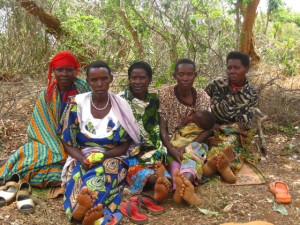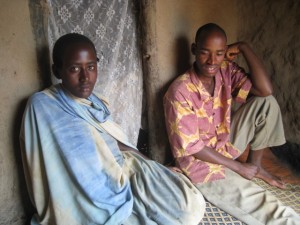A Newfound Woman? Gender roles in Tanzania and Rwanda
Despite sharing a geographical border, women's rights in Tanzania and Rwanda lie a world's distance apart. According to several female repatriated Rwandan refugees who once lived in Tanzania before being expelled by the government in 2006, Tanzanian women are not as well treated as their Rwandan counterparts.
Stories describing gender-based violence and forced polygamy are common among the female repatriates living in Ndego and Rugeyo, resettlement villages in the eastern province of Rwanda. Many also said that Tanzanian girls are often forced to marry, sometimes snatched right out of her daily duties and then introduced to her new husband.
That's what happened to Peninah Murkatete some years ago.
"When I was 16-years-old I visited my parents in Karagwe [the western province of Tanzania] on my holidays from the secondary school I attended in Uganda. One day I was out in the market and these men came and took me in the car and brought me to a house. I then met my husband and from that day on, I was married."
The repatriated women also spoke of other aspects of Tanzanian culture that tend to keep women out of positions of power, like not being a part of decision making in the household, having little to no public life, and no legal protection against gender-based violence.
In Ndego, CARE has provided workshops on both gender and economic development that help women gain more power and respect in their home and public life. In Rugeyo, local health authorities have provided sessions on women's health and gender-based violence. Women in both places have learned about making decisions in their households and they participate in public meetings. Some even operate small businesses independent of their husbands.
But still it's difficult to really measure how much these programs have shifted gender roles in the repatriated communities, since so much interaction between men and women goes on behind closed doors.
The women in Ndego's discussion group say that some men in their community have not adjusted to the way women should be treated according to Rwandan standards.
"Some men here still beat their wives like they did in Tanzania. It happens in private so it's difficult to accuse them and make it stop, but we know it's still happening," said one woman.
George Kazungu, Peninah's husband, said that many men still struggle with how to change the way they communicate with their wives and adapt to their newfound rights in Rwanda.
"It's very hard for men to adjust because there was no way a woman could rule men back in Tanzania," he said.
Although women's rights in Rwanda may be more respected than in Tanzania, there is still a long way to go.
Jeanette Nduwamariya is the project manager for CARE Rwanda's POWER program – an eight-year development plan that started in 2006 that aims to educate women in rural areas about their economic empowerment and human rights. She said the problems the women of Rugeyo and Ndego speak about as part of Tanzanian culture still exist in many parts of Rwanda.
"Although there's institutional support, people's mindsets still need to change," she said. "This will happen the more CARE and other NGOs continue to promote gender equity in rural communities across the country like they have at Ndego and Rugeyo."
--
Jean-Louis Kayitenkore
Procurement Consultant
Gsm: +250-08470205
Home: +250-55104140
P.O. Box 3867
Kigali-Rwanda
East Africa
Blog: http://www.cepgl.blogspot.com
Skype ID : Kayisa66






No comments:
Post a Comment